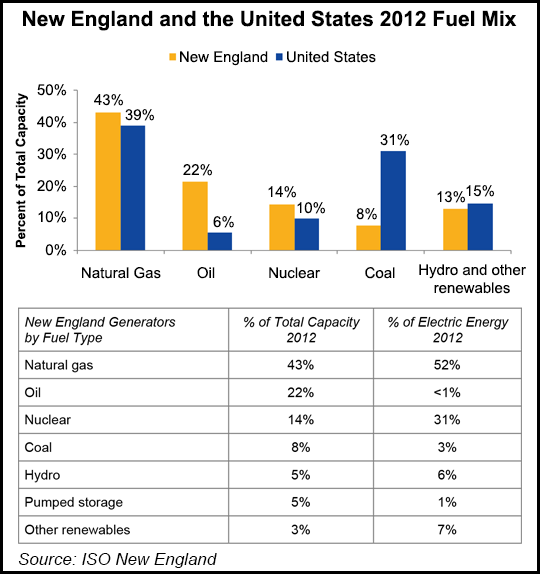Infrastructure | NGI All News Access | NGI The Weekly Gas Market Report
Different New England Proposals Compete for FERC Support
The Natural Gas Supply Association (NGSA) urged FERC to quickly approve a proposal by ISO New England Inc. (ISO-NE) to implement a “pay for performance” (PFP) system that would compensate power generators in the region when they exceed their obligations during periods of system stress.

In comments filed Wednesday with the Federal Energy Regulatory Commission, NGSA said the proposal by ISO-NE — the nonprofit regional transmission organization (RTO) that serves New England — would hold all power plants in the region to the same performance standard, regardless of the fuel used by the plants for power generation [Docket Nos. ER14-1050-000 and ER14-1050-001].
“Conceptually, ISO-NE’s proposal is based on solid market-based principles that can provide the foundation for increased reliability in the New England power market,” said NGSA Senior Vice President Patricia Jagtiani. “If implemented appropriately, PFP should help to address the serious concerns associated with electric reliability by instituting a market-based solution to incent investments by generators that help them perform more reliably and economically.
“Therefore, we believe that the commission should accept ISO-NE’s proposal without delay while continuing to seek ways to build upon that foundation to solve the lack of adequate gas infrastructure in the region. NGSA encourages the commission, to the extent possible, to limit the number of exemptions as exemptions shift responsibility to other capacity sellers.”
But in separate comments also filed Wednesday, Dominion Resources Services Inc. called PFP “unjust and unreasonable” and urged the commission to accept a competing proposal by NEPOOL, a voluntary association whose membership includes hundreds of New England market participants, including Dominion.
“[PFP] detrimentally focuses its changes on fundamentally altering the capacity product rather than addressing the true root causes of any operational problems in the ISO-NE markets — the inefficient operation of the ISO-NE energy and ancillary services markets and the flawed price signals currently sent to market participants in those markets that are inadequate to incent improved performance in real time,” Dominion said.
“Though ISO-NE appropriately identified the need to reform the real time markets a decade ago, it pursued half-measures and now seeks to fundamentally redesign the FCM [Forward Capacity Market] to make up for the flaws in the real time energy and reserve markets it let linger. The solution the ISO now champions as a panacea for real time performance issues — the PFP regime — is a heavy-handed and misguided answer to the concerns the ISO identified as justification for its proposal.”
Northeast Utilities Companies (NUSCO) also filed a comment urging FERC to reject the PFP plan and to accept NEPOOL’s alternative proposal. Other comments were submitted by the New England Power Generators Association Inc., the Electric Power Supply Association and the New England States Committee on Electricity (NESCOE).
According to NUSCO, the NEPOOL proposal would attract new investment by making incremental enhancements to existing markets for energy and ancillary services in real time. Specifically, it would change the current reserve constraint penalty factor system-wide value for 30-minute operating reserves and 10-minute non-spinning reserves. The proposal would also eliminate the concept of “shortage events” contained in existing FCM design, replacing it with an equivalent peak period forced outage rate, which is used by PJM Interconnection LLC.
NESCOE said PFP focuses on FCM with a re-defined capacity product and would leave other wholesale electricity markets unchanged, while the NEPOOL proposal “would increase administrative price adders in the energy market during periods of scarcity, replaces the capacity availability metric and associated financial incentive structure, and otherwise maintains the existing capacity product and FCM mechanics.” NESCO said it had no position supporting one proposal or the other.
Jagtiani said NGSA “has not had the opportunity to fully review the specific details of NEPOOL’s proposal, and therefore we will not comment on its merits — or concerns, if applicable.”
FERC created ISO-NE in 1997 to replace NEPOOL, which was established in 1971.
© 2024 Natural Gas Intelligence. All rights reserved.
ISSN © 1532-1231 | ISSN © 2577-9877 | ISSN © 1532-1266 |
